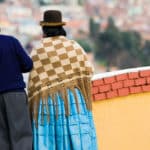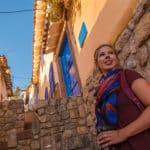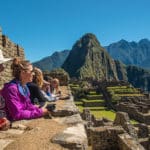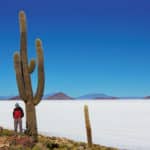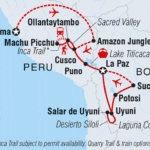Explore Peru & Bolivia
Peru and Bolivia are both lands of the epic and that which must be seen to be believed. This 25-day odyssey takes you to the world’s highest-navigable lake (Titicaca), the world’s largest tropical rainforest (the Amazon), the world’s highest administrative capital (La Paz) and the world’s largest salt flats (Uyuni). It also includes the chance to trek the Inca Trail before emerging above Machu Picchu, which isn’t actually a world-record holder but probably should be for ‘best ancient city in the clouds’. In between the gasps you can ramble through markets, sipping Pisco sours and munching ceviche with locals.
25 days, from
$5,590
per person
GROUP SIZE
ACTIVITY LEVEL
Details
Countries Visited:
Bolivia
Peru
Accommodation: Camping (with basic facilities) (3 nights), Dormitory (1 night), Homestay (1 night), Hotel (13 nights), Jungle Lodge (2 nights)
Transportation: Plane , Canoe , Boat , 4X4 , Private Vehicle , Taxi , Public Bus
Included Meals:
- 23 breakfasts
- 10 lunches
- 8 dinners
Group size: Minimum 1, Max 16
Minimum Age: 15
Trek jungle trails and track wildlife with local experts in the Amazon rainforest and spend two nights sleeping among nature in lodges.
Marvel at the mother of all Inca cities, magical Machu Picchu. Enjoy a guided tour of the ruins and free time to explore on your own.
Take a boat tour on Lake Titicaca – the world's highest navigable lake – then alight at a floating island made of reeds for a unique homestay.
Spend three days in captivating La Paz, exploring with your Bolivian leader and letting the weird and wacky Witches Market cast a spell over you.
Empty, haunting and spectacular – the laws of physics seem to bend on the Uyuni Salt Flats. Experience it on a three-day 4WD adventure across the rocky Atacama Desert.
At Intrepid we’ve always been about balancing profit and purpose and as the largest B Corp certified operator on the Inca Trail we’re committed to operating our treks for the benefit of all – join us and help make the world a better place.
Itinerary
Bienvenidos! Your journey into the Sacred Land of the Inca begins today. With indigenous cultures dating back millennia, Peru is a fascinating land of Amazonian rainforests, diverse wildlife and soaring mountains. Your adventure begins with a welcome meeting at 2 pm at your hotel in Lima, where you'll meet your tour leader and travel group. Afterwards, jump on public transport and head downtown for a guided walking tour of the city's historical centre to take in the colonial mansions, palaces and churches that line the streets. Following this, you’ll have the rest of the afternoon and evening to do as you please. You might want to visit the Museum of the Inquisition to learn about the Spanish colonialism in Peru. Otherwise, perhaps wander around the city until night falls, then embark on an optional Lima Bites and Sights Tour with Urban Adventures, taking you to the bohemian Barranco district to sample the best local street food and Pisco cocktails. For more information, visit urbanadventures.com/destination/lima-tours.
Rise and shine for your journey into the wilds of the Peruvian Amazon. Take an early morning transfer to Lima airport, then board a 3-hour flight to the Puerto Maldonado. On arrival, lodge staff will get you to pack a small duffle bag with clothing and other items needed for two days in the jungle, then you’ll stow the rest of your luggage and then travel by private vehicle to the water. Here, board a motorised canoe and cruise deep into the jungle. The journey to your eco-lodge in the Madre de Dios region will take around 3 hours, and you'll be given a packed lunch on the way. Arrive and settle in to your thatched-roof lodge before a short orientation walk of the immediate area and a briefing. Spend the evening getting acquainted with the sights and smells of the jungle, relaxing to the peaceful sounds of nature.
Get ready for an unforgettable day exploring the depths of the jungle! Set out on a half-day trek guided by local experts on the area's flora and fauna. Learn from your guides about the medicinal and practical uses for some of the plants that grow here, which indigenous people have been studying and using for thousands of years. On your walk, keep an eye out for rainbow coloured macaws and butterflies, and listen for the barking call of the peccaries and chattering of monkeys that call the jungle home. This part of the Amazon is also known to house capybaras, giant otters and jabirus, so keep your eyes peeled for these exotic creatures. Return to the lodge for lunch and some free time to relax. Once the sun goes down, venture out on a night walk in search of some of the jungle's nocturnal inhabitants.
Leave behind the natural wonders of the Amazon for the man-made wonders of Cusco today. Return to Puerto Maldonado to collect your luggage, then take a short 35-minute flight to the lofty city. If Lima is Peru's head, then Cusco is definitely the country's heart. Once you've spent some time acclimatising to the altitude of 3450 metres, head out on an orientation walk with your leader. See wonders of the ancient, colonial and contemporary variety on this stroll, including the Plaza de Armas (Main Square), the San Pedro Market, the 12 Angled Stone, Regocijo Square and San Blas Square. This tour will also include the most significant temple in the ancient Inca empire – Qoricancha. Despite being covered with a Baroque facade in the 17th century by the Spanish, the original Inca masonry has been uncovered in some areas. Wrap up your tour at the ChocoMuseo where you can sample hot chocolate made from local beans. The rest of the day is yours to enjoy as you wish. Maybe head out for dinner with your fellow travellers – your leader can recommend some good places to grab a meal. If you're feeling adventurous, why not try one of the many establishments serving up cuy, which you might know by the English name of guinea pig. Or perhaps head to Manos Unidas Cafe -a central pizzeria which also provides vocational training for young adults with intellectual and developmental disabilities.
Hop on a private bus in the morning and travel through the lush terraces of the Sacred Valley to Ollantaytambo – one of the few places where the Inca defeated the Spanish. On the way, stop at a village and enjoy lunch and conversation in a community that still practices many Inca traditions. If you’d like, you can head to the archaeological park that lies to the left side of the main square. Otherwise, if you're feeling energetic, climb to the top of the squared terraces and gaze down over the valley. Keep in mind that if you have chosen to hike the Inca Trail to Machu Picchu you will begin your trek tomorrow, so don't push yourself. Tonight, perhaps enjoy a quinoa and alpaca stew at one of the many local restaurants.
Depending on the travel arrangements you made before the trip, during the next four days you’ll be doing one of the following: hiking the Inca Trail (Route 1), hiking the Quarry Trail (Route 2) or staying in Cusco for two days before taking the train to Aguas Calientes (Route 3). All routes visit Machu Picchu.
While away from Cusco, the bulk of your luggage will be stored at your hotel. If you’re hiking the Inca Trail or the Quarry Trail, the evening before you leave Cusco you'll receive a small duffle bag to carry your clothes in for the next four days (5kg maximum). Your team of porters will carry these bags for you, together with the food and equipment for the trail. You won't have access to these items until the end of each day, as the porters will always be ahead of the group. If you’re travelling to Aguas Calientes by train, you'll be able to leave most of your luggage at the hotel in Cusco and travel with only a small bag for the overnight stay in Aguas Calientes.
Route 1 Inca Trail:
Today travel by minivan to the 82 kilometre marker and meet your crew of local porters, cook and guide. The first day includes uphill trekking to the campsite, which is at 3100m above sea level. On the way you’ll see the Inca sites of Ollantaytambo, Huillca Raccay and Llactapata, as well as incredible views of snow-capped Veronica Peak. In the evening, unwind at the campsite with a nourishing meal prepared by your cook.
Route 2 Quarry Trail:
Make an early start today and drive to Choquequilla, a small ceremonial place where Incas worshipped the moon. Drive to the starting point of the trek, Rafq'a, and meet the horsemen who join us on the hike. After an hour’s walk, reach the small community of Socma. Carry on to the Perolniyoc Cascade lookout, an opportunity to stop for photos and a food break. Continue to the campsite, which is 3700 metres above sea level. You should reach the campsite around lunchtime. After lunch, set off to explore the Q'orimarca archaeological site, which once served as a checkpoint to the Incas.
Route 3 Cusco:
After spending the night in Ollantaytambo, take a short drive to the town of Pisac. Pisac is well known for its market. Here you’ll have the opportunity to shop for souvenirs and perhaps try some local empanadas. Arrive back into Cusco in the afternoon, where your leader will take you to San Pedro Market in order to buy some things for a picnic tomorrow.
Route 1 Inca Trail:
This is the most challenging day of the trek as you ascend a long steep path (approximately 5 hours) to reach the highest point of the trail. Colloquially known as 'Dead Woman's Pass', Warmiwanusca sits at a height of 4200 metres above sea level, providing amazing views of the valley below. The group will then descend to the campsite in the Pacaymayo Valley at 3650 metres.
Route 2 Quarry Trail:
This is the most challenging and rewarding day of the hike. A 3 hour walk takes us to the top of the first pass of Puccaqasa (approximately 4370 metres high). After enjoying picturesque views of the valley, it’s a short walk before stopping for lunch. Afterwards, make the two-hour hike to Kuychicassa, the highest pass of the trek at 4450 metres. From here, descend to the sacred site the Incas called Intipunku. This is a sun gate, where the sun will stream through at particular times of the year and there are views of the Nevado Veronica mountain year-round. The Incas built several sun gates, the most notable overlooking Machu Picchu. Head to the campsite, only a stone’s throw away and at 3600 metres.
Route 3 Cusco:
Today, take a taxi to Tambomachay, an archaeological site just outside of Cusco. From here you’ll take a short downhill walk (between 1 and 3 hours) back to Cusco. On the way, stop to admire some of the archaeological sites, including Puka Pukara, Qinqu Quenqo and Saksaywaman. Arrive back in Cusco in the afternoon and enjoy some free time to go shopping, or perhaps visit Merida, Mendivil and Olave art galleries and workshops. Your tour leader will be able to give you some suggestions.
Route 1 Inca Trail:
Start the day with a climb through the Pacaymayo Valley to Runkuracay Pass (3980 metres). Enjoy views of the snow-capped mountain of Cordillera Vilcabamba before descending for around 2 to 3 hours to the ruins of Sayacmarca. Continue over the trail’s third pass to the ruins of Phuyupatamarca (3850 metres), also known as 'Town Above the Clouds'. Start the 2 hour descent down the Inca steps to the final night's campsite by the Winay Wayna archaeological site.
Route 2 Quarry Trail to Aguas Calientes:
Today’s hike will all be downhill. The first stop is the incomplete Kachiqata quarry, where the Incas were intercepted by the Spanish. Around midday, come to the end of the trek. Explore the cobbled streets of Ollantaytambo before taking the short train journey to Aguas Calientes. This is where you’ll meet up with the travellers in your group who didn't hike. Spend the night in a comfortable hotel before tomorrow’s visit to Machu Picchu.
Route 3 Train to Aguas Calientes:
After a drive to Ollantaytambo (about 1.5 hours), catch a train through the winding Urubamba Valley to Aguas Calientes (another 1.5 hours). The city is nestled in the cloud forest at the foot of Machu Picchu. This is where you’ll meet up with the travellers in your group who hiked the Quarry Trail. Spend the night in a comfortable hotel before tomorrow’s visit to Machu Picchu.
Route 1 Inca Trail:
This is the final and most spectacular leg of the trek to Machu Picchu. The day starts before dawn with breakfast at 4 am. Say farewell to the porters as they descend to the train station and then begin hiking by 4.30 am. Once the final checkpoint opens at 5 am, begin the final leg of the trek. The walk to Intipunku (the Sun Gate) takes around 2.5 hours. Weather permitting, enjoy unforgettable views over the ‘Lost City of the Incas’ as you enter Machu Picchu through the Sun Gate.
Route 2 Machu Picchu to Cusco:
Take an early bus up to Machu Picchu at 5.30 am. The city was built around 1440 AD as a country retreat for Incan nobility, but there’s evidence that the land had been a sacred Incan site for much longer. Take a guided tour around the ruins of temples, palaces and living quarters.
Route 3 Machu Picchu to Cusco:
Take an early bus up to Machu Picchu at 5.30 am. The city was built around 1440 AD as a country retreat for Incan nobility, but there’s evidence that the land had been a sacred Incan site for much longer. Take a guided tour around the ruins of temples, palaces and living quarters.
For all travellers, after taking advantage of the seemingly endless photo opportunities, it's time to catch the bus to Aguas Calientes where you’ll stop for lunch together. From here, take a scenic train ride to Ollantaytambo, then drive back to Cusco, arriving in the evening.
Enjoy free time to relax, shop and explore more of Cusco's sights. Perhaps rest your weary legs at a cafe on Plaza de Armas or head to the San Pedro Market where you can find vegetables, meats, local cheeses, chocolates, herbal medicines and many local handicrafts. It’s a great place to purchase some souvenirs or pick up ingredients for a picnic lunch. The market is also a place where many locals (and daring travellers) go to eat ‘mystery soups’. Some may be just chicken; however, the most popular among the locals usually contain frog or offal. For those who can't get enough active adventure, why not try mountain biking in the hills that surround Cusco? If you've fallen in love with the Peru's national beverage – the Pisco sour – consider joining an Urban Adventure where you will learn to craft your own, a souvenir you can impress people with for years to come. Find out more at urbanadventures.com/destination/cusco-tours or ask your leader for details.
Bid farewell to Cusco and travel by public transport through the dramatic scenery of the high altiplano to Puno. Located on the shores of vast and serene Lake Titicaca. At an altitude of 3800 metres, Lake Titicaca is the world's highest navigable lake. Along the way there will be stops to drop off and pick up passengers, which may affect travel times slightly, but the journey should take around 6 hours. The long drive is worth it for the first glimpse of immense Lake Titicaca, whose seemingly endless waters stretch into the horizon. Puno is a melting pot of indigenous Aymara and Quechuan culture and traditional Andean customs, and it wears its traditions on its sleeve. If you're lucky, your trip will coincide with one of the many cultural festivals here. Perhaps ask your leader where you can get the best grilled trout tonight – a true local specialty.
Embark on a tour of the lake by slow motor boat, stopping at the floating Uros Islands. Built by the Uros people to protect themselves from encroaching Inca forces hundreds of years ago, the islands are constructed from many layers of totora reeds that grow in the shallows of the lake. Feel the bizarre sponginess of the island underfoot and learn a little about the history of the communities that called them home. Then, get a closer look at contemporary life on the shores of the lake with a homestay in a local community. Help your host family with their daily activities, try out a few words in Quechua (most importantly 'solpayki' or thank you!) and perhaps join a local soccer game and make some friends on the makeshift pitch.
This morning after breakfast you'll board the motor boat again and cruise to Taquile Island (approximately 1 hour), which is known for the intricate, hand-knitted textiles the locals produce. Here, knitting is strictly a male domain, and women do the spinning. It's a great place to pick up some high quality, locally knitted goods. An approximately one-hour uphill trek brings you to the main area of the island, where you can shop for handicrafts and observe the symbolic clothing items worn by the local folk. After the visit, descend about 500 steps to the boat. Return to Puno, a journey that will take around 3 hours. Once back in Puno, perhaps gather a crew and find a local watering hole to enjoy a drink or two. By now you've probably had your fair share of Pisco sours, so maybe try a chilcano. While it also features a Pisco base, the cocktail is completed with ginger beer instead of egg whites.
Trade the still waters and quiet villages of Lake Titicaca for the bustling highland city of La Paz. Travel by comfortable local bus to Desaguadero and cross the border into Bolivia. At the border you will say goodbye to your Peruvian leader and a Bolivian leader will take over for the last portion of your tour. After border formalities at the Peruvian migration office, cross the bridge to Bolivia, submit your passport at the Bolivian migration office, then board the bus again. Continue to La Paz, stopping en route for another document check. The journey to La Paz takes about 5 hours (don't forget that Bolivia's timezone is 1–2 hours ahead of Peru). Discover the colonial architecture and browse the markets on a walking tour, taking in the vibrant expressions of indigenous culture. According to a 2012 census, just over 40 percent of Bolivia's adult population are of indigenous origin, but discrimination stymied overt expressions of indigenous heritage until very recently. Aymara women wearing the traditional, distinctive bowler hat and long, layered skirts, for example, were banned from many public buildings until 2006. Over the last decade, grassroots activism and a shifting political landscape has created space for various indigenous cultures to live openly. After the walking tour, why not head to the Witches' Market in search of folkloric remedies, potions and totems – it's a great place to pick up a last-minute souvenir.
Kamisaki! At around 3600 metres, you’ll feel like you’re on top of the world in La Paz. Although Sucre is the official capital of Bolivia, La Paz is the centre of industry – the country’s brain. Despite the abundance of colonial architecture, La Paz's indigenous roots run deep, and the atmosphere in the market-filled streets is both modern and traditional. After a 6 pm welcome meeting, enjoy an orientation walk with your leader and get to know the winding streets and pokey alleys. After the meeting, maybe head out into the city, situated in the middle of a vast volcanic crater. Breathe the ‘thin’ air, marvel at the vistas of buildings clinging to the canyonsides, and explore the lively streets like Calle Jaen.
This morning, leave La Paz behind and travel by private vehicle to Uyuni – the gateway to Bolivia’s acclaimed salt flats. You’ll head off around 8.30 am this morning and will arrive late in the afternoon, so be sure to have a book or some podcasts ready, and some snacks on hand. Along your way, stop for some lunch with your group. Arriving in Uyuni feels a bit like you've reached the end of the road, which in many ways is true. This remote small town sits on the edge of the high altiplano – a wilderness that extends for hundreds of kilometres towards the border with Argentina and Chile. Once arrived, check in and relax into your hotel in Uyuni town. Although basic, your accommodation for tonight is clean and comfortable, and may be the last time you’ll have a hot shower for a few days!
Uyuni is the starting point of your 4WD excursion into Salar de Uyuni and the Andean Desert. This morning you will stop by the Train Cemetery, three kilometres outside of Uyuni Town, connected to it by the old train tracks, and see where families of abandoned locomotives rust slowly in the sun. Continue on to the town of Colchani, which produces salt the old-fashioned way, before heading into the salt flats. Endless skies meet endless white plains, and it's a pretty hypnotic sight – don't forget to snap loads of photos! Stop by an intriguing salt hotel and drive to an island of cacti that rises like a jagged reef in the desert. Known as Isla Inca Wasi, or Fish Island, this fossil-strewn outcrop was once the top of an ancient volcano, and you’ll have the chance to go on an optional hike here. After a big day of driving, head south to a small village and your homestay-style accommodation. Settle in and enjoy an included dinner.
After breakfast, continue driving through the incredible landscapes of the Andean Desert, with another day deep in the wilderness. Pass by Chiguana Salt Lake, the still-active Ollague Volcano, and other small lakes of different colours – perhaps with a flamboyance of flamingos standing nearby! Continue on to the Siloli Desert, which is known for its mountain of seven colours, Arbol de Piedra (Stone Tree) rock formation, and some pretty epic vistas. You’ll also get the chance to venture into an Andean wildlife reserve (Reserva de Eduardo Avaroa) and hike around the Laguna Colorada (Red Lake), keeping an eye out for llamas, flamingos, vicunas, and foxes along the way. Once all the sightseeing is over for another day, retire to your dormitory accommodation in a local Huayllajara community for a well-earned rest and included dinner.
Leave your lodge nice and early to try and catch the sunrise over the surrounding geysers. These bubbling fumaroles are especially active in the morning, thanks to the cold air. There may be an opportunity to stop at a local hot spring for a quick dip (optional), then to Laguna Verde to take some pictures of the water’s striking green hues. Afterward, pass through more barren desert landscapes, some of which are frequently compared to Salvador Dali’s paintings. Onwards to Capina Lake, Valle de Rocas (Rock Valley), and the San Cristobal mining town. You’ll arrive back in Uyuni around 5 pm to spend the night at your leisure – after the last few days in the Bolivian wild, this could be the right time to find a comfy local restaurant for an optional dinner and drinks with your travel crew.
Today, say goodbye to Uyuni, and catch a local bus for about 4 hours along the scenic route to Potosi, where you’ll arrive in the early afternoon. Potosi has had a turbulent past, centred mostly around its mining successes and failures. Once the predominant supplier of silver to colonial-era Spain, Potosi briefly celebrated life as one of the richest cities in the world. Explore the architectural remnants of this period of industry on a leader-led orientation walk, then the afternoon and evening are yours. Perhaps visit the Santa Teresa Convent Museum to observe the art and treasures on display inside the convent’s original walls or the National Mint Museum.
After a lazy morning to explore Potosi, take a local bus early in the afternoon and arrive in Sucre after approximately 4 hours, disembarking in the temperate valley city. Bolivia's official capital, Sucre was declared a UNESCO World Heritage site in 1991 and has retained the flavour of its colonial heritage in its churches, museums and ancient mansions. Most of the town's colonial buildings have been whitewashed, earning it the nickname the 'White City'. On arrival, you'll have plenty of free time to explore the city and get your bearings.
Take a few days to explore Bolivia’s capital. After an orientation walk, compare shoe sizes with a dinosaur at Cal Orcko, where 68 million-year-old footprints have been discovered. This is the largest collection of dinosaur footprints in the world, over 12,000 of them! Then, you might like to visit the Museo de la Recoleta, a 400-year-old convent on top of the hill that provides great views over the city and is home to a fascinating collection of sculptures and paintings. Or maybe head to the Plaza 25 de Mayo to rub shoulders with Sucre's affluent residents and investigate the extravagant interior of the Senora de la Merced.
Today, set out for an included hike along the ancient Pre-Incan path known as the Chataquila trek. The trek is relatively easy being that it is mostly downhill. On the way down enjoy the stunning views of the Andes and the valleys. In the afternoon, perhaps head up to Recoleta, an old convent on top of the hill, giving some great views of the city. Adrenaline junkies might also like to take to the surrounding peaks for some excellent mountain biking options or perhaps give hang gliding a shot. Most of today and tomorrow are free to take up some additional optional activities in and around town, so it’s up to you what you’d like to do and see! Bolivian dance show, or textile museum, anyone?
Today is a free day to explore Sucre before catching a late flight to La Paz.
Today is the final day of your tour and there are no activities planned, so you are free to leave at any time. With so much to see and do, you might want to spend an extra day or two checking out the city. We’ll be happy to organise additional accommodation for you (subject to availability).
